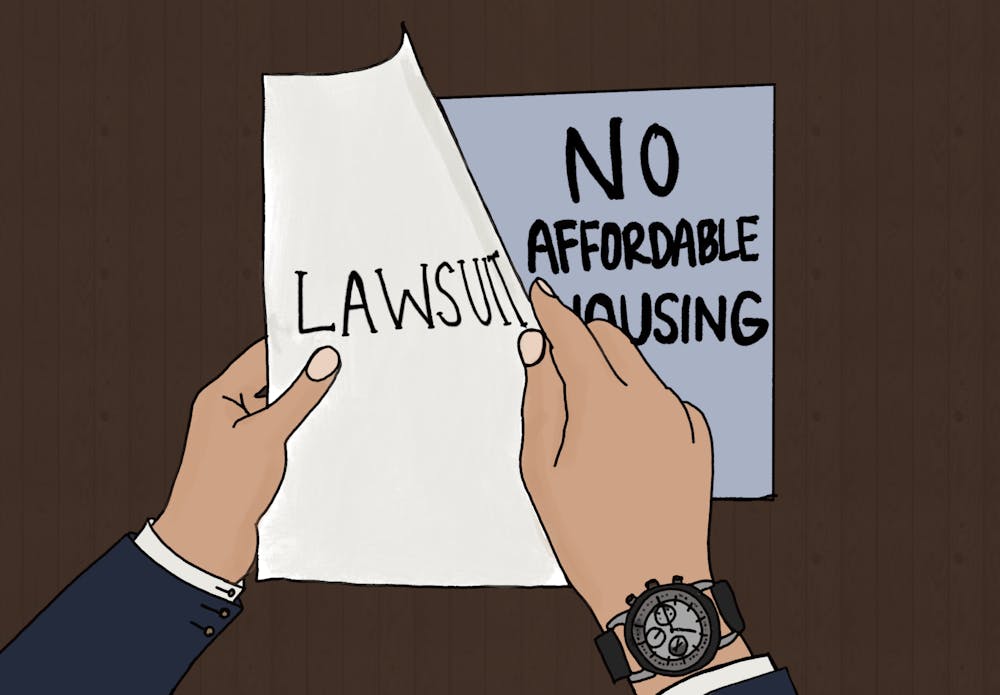After seven years of hard work by advocates, the path to affordable housing in Charlottesville seemed clearer than ever before. Charlottesville’s new zoning ordinance which promised unprecedented change was set to go into effect this February after getting approved by the Charlottesville City Council last December. In essence, this ordinance proposed more multifamily and higher density housing in hopes that, with an increase in housing units, lower housing prices would follow. Many people were convinced that this was the right course of action. And then, another roadblock was presented — affluent homeowners in Charlottesville filed a lawsuit against the City in an effort to prevent the ordinance from becoming reality. While the foundations of this lawsuit may be legally justifiable, this lawsuit is ultimately riddled with false and silly pretenses, which imply a more sinister motive to undo years of progress towards affordable housing in Charlottesville.
Using a lawsuit to strike down a zoning ordinance illustrates a common and dangerous practice of using money and power to stifle representative, democratic action. The plaintiffs, who almost all reside in the affluent neighborhood of Barracks-Rugby, dispute the zoning ordinance’s legal standing on the alleged grounds that the City did not follow Virginia law in its comprehensive plan. Specifically, the City Council only sent the transportation chapter — and not the entire plan, as they say the law requires — to the Department of Transportation. According to the plaintiffs, the plan, and as such the entire zoning ordinance, should therefore be void. It is astounding how the plaintiffs, in filing this lawsuit, believe that such a nitpicky legal argument should dismantle affordable housing plans that have been voted on by elected City Council representatives. Let us be clear — we are not legal scholars. However, weaponizing legal technicalities against individuals who have been systematically barred from a basic right to housing should not be tolerated.
In addition to unobserved bureaucratic niceties, the Charlottesville homeowners also loftily argue that their small town charm will “suffer” from the zoning ordinance because of increases in population density. The plaintiffs also worry that the City of Charlottesville has not done sufficient work to study the effects of this plan, such as increased traffic congestion and potential sewage problems. It is worth noting, however, that the plaintiffs seem to be alone in their concerns. Advocates for affordable housing, such as the Charlottesville Low-Income Housing Coalition and the Fifeville Neighborhood Association have raised no such concerns and have actually endorsed the plan. These organizations have cultivated extensive expertise regarding housing policies — expertise which many of the plaintiffs do not have — so one must wonder how much evidence actually backs the plaintiffs' concerns. What does seem true is that the complaints of the plaintiffs prioritize small town aesthetics and personal inconvenience over the universal right to housing.
This strategy of deploying legal minutiae to undermine social projects is not unprecedented in Virginia. One year ago in Arlington County, Va., which also has a history of high housing prices and exclusionary zoning policies, some residents filed a lawsuit concerned with how their “village-type atmosphere” would be ruined by diversified housing options — in other words, any housing that was not single-family complexes. Despite this silly lawsuit, Arlington County’s commitment to solving the affordable housing crisis has not abated, as officials continue to approve higher-density housing projects — showcasing that multifamily housing is not incompatible with a community’s prosperity. The similarly unsubstantial attempt to stop affordable housing progress in Arlington, Va. should send a clear message to the Charlottesville plaintiffs — they are not the first ones to interfere with affordable housing, and the courts should not appease their concerns.
Building affordable housing, to those who truly care about its success, is about more than just lowering housing prices or increasing multifamily residences — it is about investing in a future where every member of our community has equal access to basic rights, such as housing. Beyond the basics, local affordable housing organizations say the ordinance will also work to secure racial justice, economic equity and sustainable development. When compared with these benefits, the grievances of the lawsuit are little more than the prioritization of small town aesthetics over quality of life.
If there was any doubt that the University is intertwined with and responsible for exacerbating the affordable housing crisis in Charlottesville, this lawsuit dispels that doubt. Three of the nine plaintiffs are law professors at the University. Our own professors are utilizing a system of justice in which they are well-versed to trample the voices of the often unheard residents of Albemarle County. Whether we like it or not, we are and have been neighbors — poor neighbors — to Charlottesville. We cannot ignore this obvious fact, and changing it requires conscious and diligent effort.
The potential that this zoning ordinance has to alleviate the housing crisis in Charlottesville is undeniable. This lawsuit endeavors to tiptoe around democratic processes and disregard the voices of the disempowered in order to amplify the voices of the already powerful. The plaintiffs at play have no regard for their fellow neighbors only for the status quo. Not only is this lawsuit silly, but it is dangerous — we cannot let the bucolic ideal of a small town overshadow the serious need for affordable housing reform in Charlottesville.
The Cavalier Daily Editorial Board is composed of the Executive Editor, the Editor-in-Chief, the two Opinion Editors, their Senior Associates and an Opinion Columnist. The board can be reached at eb@cavalierdaily.com.







